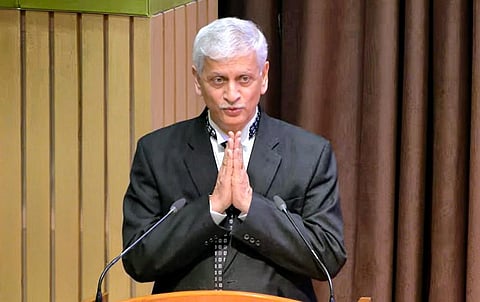

NEW DELHI: Days after demitting office as the 49th Chief Justice of India, U U Lalit on Sunday stood by the collegium system of judges appointing judges, saying it is here to stay. “In my opinion, the collegium system is the best. It has proved to have worked effectively. Collegium system is here to stay. We need to improve that to the extent possible. Make it more functional, easy and more accessible,” he said.
In an interaction with the media at his residence, he said that if the government wants to introduce the National Judicial Appointments Commission (NJAC) bill again, it is their prerogative. He went on to say that vacancies will be filled as per established norms.
Responding to Union law minister Kiren Rijiju’s comment criticising the collegium system as opaque and unaccountable, he said, “That is his personal opinion... If there is a need to improvise the present system, then there is a need for dialogue.”
Regarding the extraordinary special sitting held by the Supreme Court on Saturday to hear the Maharashtra government’s appeal against the discharge of Professor G N Saibaba and five others in an Unlawful Activities Prevention Act case, he said there was nothing unusual about it. All he did was to act on information from the registry to set up the special bench after consulting many judges and finding out who were available that day. They were not told about the case, he added.
Clearing the air on the acquittal of all convicts in the 2012 Chhawala gang-rape case in Delhi, Justice Lalit said, “Unless and until guilt is completely established, circumstantial evidence case theory isn’t to be accepted. There were actually no circumstances that could point in that direction conclusively. The law is that the chain must get complete...the benefit of the doubt must flow in that direction. We did not find material good enough to sustain the conviction.”
Okay with retirement
On tenure of SC judges and their retirement age, he said, “In US & Canada very limited number of matters reach the SC. Here the situation is completely different. In a country where the talent is enormous, it’s better that judges retire so that new judges could come in.”
Deprecating criticism of judges on social media, Justice Lalit said there is need for deference or temperament. “Immediate comments on the social media is wrong. It should be within a limit.”
On entry of women into judiciary, the judge said, “You must give preference to ladies so that there is adequate reference across the board.”